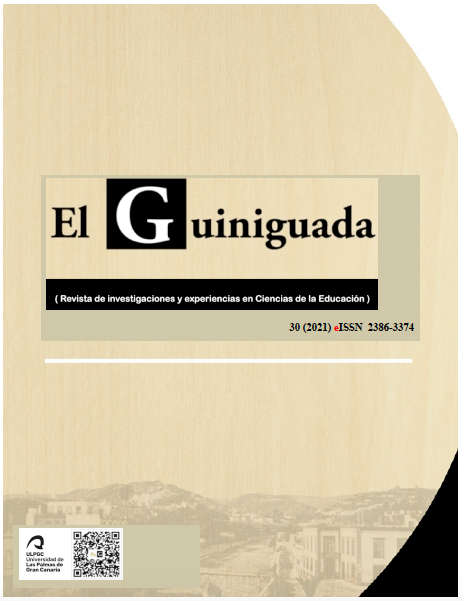Sensitization about disability through simulation in Physical Education
doi.org/10.20420/ElGuiniguada.2021.415
Keywords:
INTERVENTION, DISABLED STUDENTS, PRIMARY EDUCATION, INCLUSIVE EDUCATION, SIMULATIONAbstract
ABSTRACT
The objective of this study was to evaluate the changes produced in attitudes towards disability in 43 students in 5th grade of primary education through a simulation program in Physical Education. A questionnaire was used both before and after the intervention. Results showed an improvement in attitudes in 2 of the 3 dimensions studied in the questionnaire by both boys and girls, being this change statistically significant only in 1 of the dimensions in boys. All these results match some studies, but differ from others, becoming necessary the existence of a bigger number of this kind of studies in order to prove widely the efficacy of this interventions.
Downloads
References
Block, M. E., Klavina, A. y Flint, W. (2007). Including Students with Severe, Multiple Disabilities in General Physical Education. Journal of Physical Education, Recreation & Dance, 78(3), 29-32. https://doi.org/10.1080/07303084.2007.10597986
Block, M. E. y Obrusnikova, I. (2007). Inclusion in Physical Education: A Review of the Literature from 1995-2005. Adapted physical activity quarterly, 24(2), 103-124. https://doi.org/10.1123/apaq.24.2.103
De Boer, A., Pijl, S., Post, W. y Minnaert, A. (2011). Which variables relate to the attitudes of teachers, parents and peers towards students with special education needs in regular education? Educational Needs, 38(4), 433-448. https://doi.org/10.1080/03055698.2011.643109
Felipe, C. y Garoz, I. (2014). Actividad físico-deportiva en programas de cambio de actitudes hacia la discapacidad en edad escolar: Una revisión de la literatura. Cultura, Ciencia y Deporte, 9(27), 199-210. http://doi.org/10.12800/ccd.v9i27.462
Flórez, M. A., Aguado, A. L. y Alcedo, M. A. (2009). Revisión y análisis de los programas de cambio de actitudes hacia personas con discapacidad. Anuario de Psicología Clínica y de la Salud, 5, 85-98. http://institucional.us.es/apcs/doc/APCS_5_esp_85-98.pdf
French, S. (1992). Simulation Exercises in Disability Awareness Training: a critique. Disability, Handicap & Society, 7(3), 257-266. https://doi.org/10.1080/02674649266780261
García, J. (2017). Evolución legislativa de la educación inclusiva en España. Revista de Educación Inclusiva, 10(1), 251-264. https://revistaeducacioninclusiva.es/index.php/REI/article/view/271
Hilderley, E. y Rhind, D. (2012). Including children with cerebral palsy in mainstream physical education lessons: a case study of student and teacher experiences. Graduate Journal of Sport, Exercise and Physical Education Research, 1(1), 1-15. https://www2.worc.ac.uk/gjseper/documents/Children_with_cerebral_palsy_in_mainstream_physical_ed_case_study_student_teacher_experiences.pdf
Hurst, C., Corning, K. y Ferrante, R. (2012). Children’s Acceptance of Others with Disability: The Influence of a Disability-Simulation Program. Journal of Genetic Counseling, 21(6), 873-883. https://doi.org/10.1007/s10897-012-9516-8
Hutzler, Y. (2003). Attitudes Toward the Participation of Individuals with Disabilities in Physical Activity: A Review. Quest, 55(4), 347-373. https://doi.org/10.1080/00336297.2003.10491809
Jovanovic, L., Kudlacek, M., Block, M. E. y Djordjevic, I. (2014). Self-efficacy of pre-service physical education teacher toward teaching students with disabilities in general physical education classes in Serbia. European Journal of Adapted Physical Activity, 7(2), 32-46. https://doi.org/10.5507/euj.2014.009
Kalyvas, V. y Reid, G. (2003). Sport Adaptation, Participation, and Enjoyment of Students with and without Physical Disabilities. Adapted Physical Activity Quarterly, 20(2), 182-199. https://doi.org/10.1123/apaq.20.2.182
Kiger, G. (1992). Disability Simulations: Logical, Methodological and Ethical Issues. Disability, Handicap & Society, 7(1), 71-78. https://doi.org/10.1080/02674649266780061
Lijuan, W., Jing, Q. y Lin, W. (2015). Beliefs of Chinese physical educators on teaching students with disabilities in general physical education classes. Adapted Physical Activity Quarterly, 32(2), 137-155. http://doi.org/10.1123/APAQ.2014-0140
Loovis, E. M. y Loovis, C. L. (1997). A Disability Awareness Unit in Physical Education and Attitudes of Elementary School Students. Perceptual and motor skills, 84(3), 768-770. https://doi.org/10.2466/pms.1997.84.3.768
Ocete, C., Pérez-Tejero, J., Franco, E. y Coterón, J. (2017). Validación de la versión española del cuestionario “Actitudes de los alumnos hacia la integración en educación física (CAIPE-R)”. Psychology, Society, & Education, 9(3), 447-458. http://doi.org/10.25115/psye.v9i3.1025
Özer, D., Nalbant, S., Aglami, E., Baran, F., Kaya Samut, P., Aktop, A. y Hutzler, Y. (2013). Physical education teachers ́ attitudes towards children with intellectual disability: the impact of time in service, gender, and previous acquaintance. Journal of Intellectual Disability Research, 57(11), 1001-1013. http://doi.org/10.1111/j.1365-2788.2012.01596.x
Reina, R., Sierra, B., García, B. y Fernández, Y. (2016). Incluye-T: Educación Física y Deporte Inclusivo. Limencop S.L.
Ríos, M. (2009). La inclusión en el área de Educación Física en España. Análisis de las barreras para la participación y aprendizaje. Ágora para la Educación Física y el Deporte, (9), 83-114. http://riberdis.cedd.net/bitstream/handle/11181/3837/inclusion_en_el_area_de_educacion_fisica_en_espa%c3%b1a.pdf?sequence=1&rd=0031113748826728
Taliaferro, A. R., Hammond, L. y Wyant, K. (2015). Preservice physical educators' self- efficacy beliefs toward inclusion: the impact of coursework and practicum. Adapted Physical Activity Quarterly, 32(1), 49-67. http://doi.org/10.1123/apaq.2013-0112
Vickerman, P. y Coates, J. (2009). Trainee and recently qualified physical education teachers ́ perspectives on including children with special education needs. Physical Education and Sport Pedagogy, 14(2), 137-153. http://doi.org/10.1080/17408980802400502
Published
How to Cite
Issue
Section
License
Authors who publish with this journal agree to the following terms:
- Authors retain copyright and grant the journal right of first publication with the work simultaneously licensed under a Creative Commons Attribution License that allows others to share the work with an acknowledgement of the work's authorship and initial publication in this journal. You can not make a commercial use of the work. The use derived from the work is also not allowed.
- Authors are able to enter into separate, additional contractual arrangements for the non-exclusive distribution of the journal's published version of the work (e.g., post it to an institutional repository or publish it in a book), with an acknowledgement of its initial publication in this journal.
- Authors are permitted and encouraged to post their work online (e.g., in institutional repositories or on their website) prior to and during the submission process, as it can lead to productive exchanges, as well as earlier and greater citation of published work (See The Effect of Open Access).
















